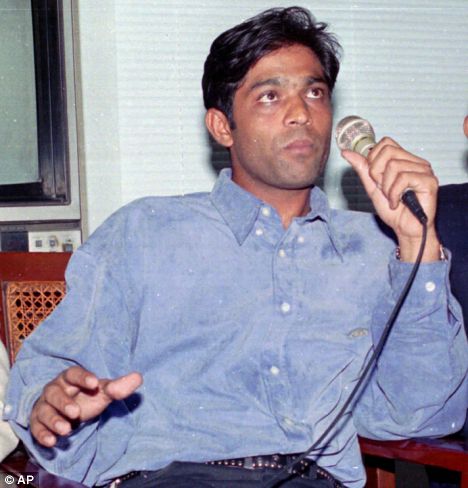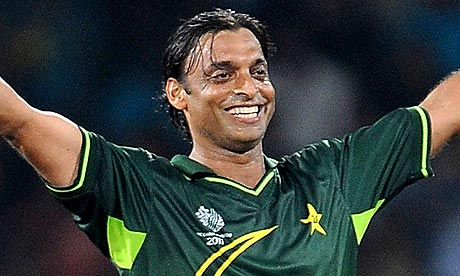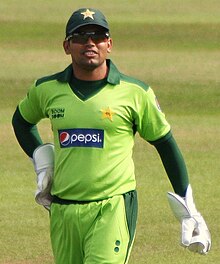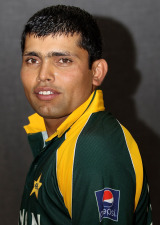Rashid Latif Biography
Source (google.com.pk)Rashid Latif (born October 14, 1968 in Karachi) was a Pakistani cricketer. He started playing for the Pakistani national team in 1992 after the World Cup. He impressed the selectors by hitting a fine 50 in his Test debut. This however did not cement his place in the national squad as he was throughout his career in competition with another Pakistani wicketkeeper named Moin Khan. This led to ongoing changes of wicket-keepers for the next decade. In 1996, he announced retirement after differences with some team players and the team management. He came back shortly and became the captain of Pakistani cricket team in 1998. Soon however, again due to differences, he was dropped from the team and again replaced by Moin. Latif remained out of the national squad until 2001 when after a string of poor performances, the Pakistani team replaced Moin Khan (who was the captain) with Rashid . After coming back into the squad, he somewhat cemented his place in the squad by keeping the wicket and giving a string of good batting performances. The highlight of his career came when after the 2003 Cricket World Cup, he was announced the captain of the Pakistani team. Under him, Pakistan successfully experimented with several new players and the team gave positive results. He was also involved with uniting the players through his captaincy skills both on and off the field. However, differences between Latif and the team management again surfaced in 2003-2004 which saw him the captaincy to Inzamam-ul-Haq. He was omitted from the squad and since has been out of the team despite his attempts to get back into squad during 2003-2005. As of April 2006, Rashid Latif have retired from first class cricket as he toured with Pakistani senior players to play against Indian senior players in April 2006. This series is played between players who have retired from the sport. Also, according to statistics available on cricinfo's website, it can be seen that Rashid Latif has not participated in first class cricket since 2005. His last international outing was in 2006 when he played for England's Lashings cricket club.
Pakistani wicket keeper and a right handed batsman who represented the Pakistani cricket team in Test cricket and One Day International matches, between 1992 and 2003. He also served as the captain of the Pakistan cricket team in 2003. Latif is the current coach of the Afghan National Cricket Team.
was a Pakistani cricketer. He started playing for the Pakistani national team in 1992 after the World Cup. He impressed the selectors by hitting a fine 50 in his Test debut. This however did not cement his place in the national squad as he was through out his career in competition with another Pakistani wicketkeeper named Moin Khan. This led to ongoing changes of wicket-keepers for the next decade. In 1996, he announced retirement after differences with some team players and the team management. He came back shortly and became the captain of Pakistani cricket team in 1998. Soon however, again due to differences, he was dropped from the team and again replaced by Moin.
Latif remained out of the national squad until 2001 when after a string of poor performances, the Pakistani team replaced Moin Khan (who was the captain) with Rashid . After coming back into the squad, he somewhat cemented his place in the squad by keeping the wicket and giving a string of good batting performances. The highlight of his career came when after the 2003 Cricket World Cup, he was announced the captain of the Pakistani team. Under him, Pakistan successfully experimented with several new players and the team gave positive results. He was also involved with uniting the players through his captaincy skills both on and off the field. However, differences between Latif and the team management again surfaced in 2003-2004 which saw him the captaincy to Inzamam-ul-Haq. He was omitted from the squad and since has been out of the team despite his attempts to get back into squad during 2003-2005.
International Debut: 1992
Batting and fielding records
M Inns NO Runs HS Ave BF SR 100 50 4s 6s Ct St
Test 37 57 9 1381 150 28.77 2912 47.42 1 7 156 5 119 11
ODI 166 117 29 1709 79 19.42 2237 76.40 - 3 125 18 182 38
Bowling records
M Inns Balls Runs Wkts BBI BBM Ave Eco SR 4W 5W 10W
Test 37 1 12 10 - - - - 5.00 - - - -
ODI 166 - - - - - - - - - - - -
Career Statistics
Test Debut: England v Pakistan at London, 06-09, Aug 1992
ODI Debut: England v Pakistan at Nottingham, Aug 20, 1992
Profile
Neat as he was as a wicketkeeper and as a batsman (he was selected for his Test debut on the strength of his batting), Rashid Latif earned more fame for his controversial acts than for his cricketing deeds. He announced his retirement in the middle of Pakistan's 1994-95 tour of Zimbabwe, following some fishy goings-on in South Africa under Salim Malik's captaincy, then returned as "Mr Clean" to captain the side after he had given plenty of evidence to Judge Qayyum's inquiry. All went well at first in South Africa in 1997-98 until he found, like Rameez Raja and Aamir Sohail, that certain senior players did not want things to change. He made a surprise return to the colours for the 2001 tour of England, and got a second shot at the captaincy when Waqar Younis was sacked after Pakistan's miserable performance at the 2003 World Cup. There was more controversy to follow, though. He kept up his crusade to clean up the game, writing an open letter to the ICC, warning of the dangers of "fancy fixing". Then, he was suspended for five matches for wrongly claiming a catch during the series against Bangladesh. These incidents led to the souring of relations between him and the Pakistan board, and ultimately resulted in his stepping down from captaincy at the end of that series.
As of April 2006, Rashid Latif have retired from first class cricket as he toured with Pakistani senior players to play against Indian senior players in April of 2006. This series is played between players who have retired from the sport. Also, according to statistics available on cricinfo's website, it can be seen that Rashid Latif has not participated in first class cricket since 2005. His last international outing was in 2006 when he played for England's Lashings cricket club.
Latif started playing for the Pakistan national cricket team in 1992 after the 1992 Cricket World Cup. He impressed the national selectors by scoring 50 runs in his Test debut, However it did not cement his place in the national squad, throughout his career because he was competing with another Pakistani wicketkeeper, Moin Khan. This led to ongoing changes of wicket keepers for the next decade. In 1996, he announced his retirement after conflicts with some team players and the team management. He returned back to the Pakistan team and became the captain of Pakistan in 1998.
Latif remained out of the national squad until 2001, when after a string of poor performances, the Pakistan team replaced Moin Khan, who was selected as the captain. After returning back into the squad, he somewhat cemented his place by keeping the wicket and giving a string of good batting performances. The highlight of his career came when after the2003 Cricket World Cup, he was announced as the captain of the Pakistan team. Under his leadership, Pakistan successfully experimented with several new players and the team gave positive results. He was also involved with uniting the players through his captaincy in both on and off the cricket field. However, indifferences between Latif and the team management again surfaced in 2003-2004, which resulted in him giving away the captaincy to former Pakistan batsman Inzamam-ul-Haq. He was omitted from the squad and since then was never recalled in the team, despite his attempts to get back into the squad during 2003-2005.
Rashid Latif
In April 2006, Latif has retired from First class cricket as he toured with the Pakistani senior players to play against Indian senior players in April 2006. This series is played between players who have retired from professional cricket. Also, according to statistics available on ESPN cricinfo sport's website, it can be seen that Latif has not participated in first class cricket since 2005. His last international match was in 2006, when he played for Lashings cricket club, a club in England.
Rashid Latif

Rashid Latif
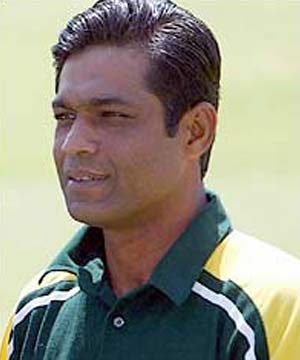
Rashid Latif
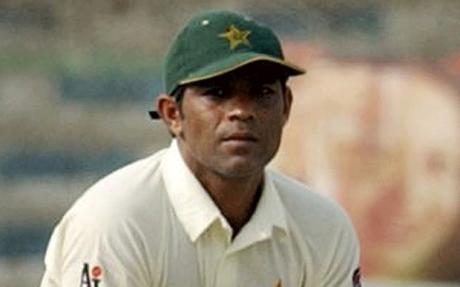
Rashid Latif

Rashid Latif

Rashid Latif

Rashid Latif

Rashid Latif

Rashid Latif

Rashid Latif
